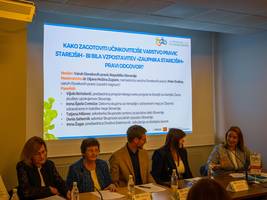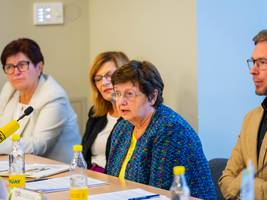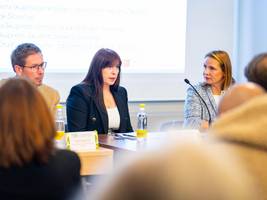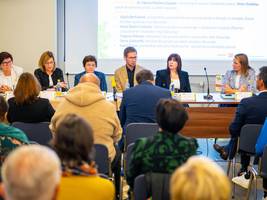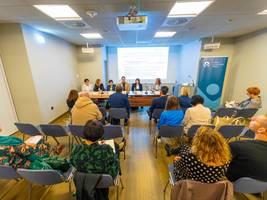On the occasion of the International Day of Older Persons, which is celebrated on 1 October, the Human Rights Ombudsman (Ombudsman) organised a roundtable at the Festival of the Third Age (Festival) titled How to Ensure a More Effective Protection of the Rights of Older Persons - Would the Establishment of an 'Older Person's' Advocate be the Right Answer?
At the roundtable, the Human Rights Ombudsman Peter Svetina pointed out that the institution of the Ombudsman receives an ever-increasing number of complaints from older persons related to a variety of hardships and prejudices they encounter in their everyday lives, such as digital exclusion, ageism, and discrimination, loneliness, the unavailability of medical services, etc. As he stated, the numerous complaints received by the Ombudsman also bring to light various forms of violence that retirement home residents are subject to, which is concerning. “As a society, we must at all times and everywhere maintain a zero-tolerance policy towards violence and must ensure victims can speak up about it as well as find a safe environment. Additionally, it is essential to invest in the assurance of safety, training, and education of everyone, especially individuals hailing from professions where working with older persons is commonplace. Findings based on responses by the leaderships of retirement homes that received our inquests have shown that the lack of adequate human resources is the key issue. However, there is also a lack of awareness of what behaviour is acceptable and what is not. We at the Ombudsman's office often call to immediate action regarding this,” Svetina said at the roundtable.He added that the establishment of a so-called older person's advocate could be one of the possible broader measures, which would then be available to assist older persons in facing various hardships they encounter. This could be an essential element in improving the quality of care and protecting the rights of older persons in Slovenia, including those in retirement homes. Namely, those residing in institutions are an especially endangered group among this part of the population. Older persons, especially in retirement homes, represent one of the most vulnerable parts of society that has often gone overlooked. “Concurrently, I would like to point out the alarming situation in retirement homes. Namely, most retirement homes face severe staffing shortages, as employees are leaving due to wage dissatisfaction, many of them leaving for areas where the pay is better and where there is no work on Sundays, holidays, or night shifts. We obtained information that this resulted in many empty retirement home beds and that staffing shortages caused certain departments to be closed. Even some newly opened homes cannot begin operating due to staff shortages, or at least not at full capacity. At the same time, there are long waiting lists for applicants who cannot access social security services due to the reasons mentioned earlier,” Svetina highlighted.
The Deputy Ombudsman, Dr Dijana Možina Zupanc, emphasised during the roundtable that there exists a void in the existing system for the protection of the rights of older persons, who often find themselves without anyone to turn to in difficult situations, nor do they have anyone to turn to in case of violence, abuse, neglect or exploitation, or any other form of violations. “That is why the Ombudsman has been recommending the establishment of a mechanism or a network of older person advocates who would be the voice of older persons – both those in home environments and those in institutionalised care. Furthermore, the systemic gaps which limit or even discriminate older persons from realising their rights must also be considered. The system must ensure older persons' dignity, safety, and the power of co-decision about themselves,” Dr Možina Zupanc said.
The other roundtable participants also agreed that the current protection of older persons' rights is inadequate and insufficiently effective. They agreed it is necessary to take steps towards the establishment of older persons advocates, as almost a quarter of the Slovenian population is aged 65 years or higher, and their share of the total population is only growing. Thus, these issues need to be addressed immediately.
At the roundtable, the Human Rights Ombudsman Peter Svetina appealed to the competent authorities to remedy existing inadequacies, which are both reflected in such drastic staff shortages in social security institutions and the lagging deinstitutionalisation process that would allow individual access to alternative forms of help in their home environments. “The state must offer more forms of community care – daycare centres, housing groups, residential units, some of which are already operating successfully, and inform older persons on these options more actively,” said Svetina.
For this occasion, the institution of the Human Rights Ombudsman published a publication titled Tudi starejši imamo svoje pravice (We older persons have rights as well), with which they wish to inform older persons on their rights and their options should their rights be violated. The booklet also contains a concise list of contacts of key institutions that can offer help when older persons find themselves experiencing hardships. It will not only be available for Festival attendees but also in retirement homes, social welfare centres, and municipalities that already have Ombudsman’s Corners.
The Ombudsman also cooperates with the Festival by having a stand where visitors can discuss possible rights violations with the Ombudsman's experts, get acquainted with the Ombudsman's mission, obtain information on when and how they can turn to the Ombudsman for help, or have a leisurely chat about the work of the institution of the Human Rights Ombudsman of the Republic of Slovenia.
___________________________________________________________________
The roundtable also featured Tatjana Milavec of the Association of Centres for Social Work, Denis Sahernik of the Association of Social Institutions of Slovenia, Irena Žagar of the Silver Thread Association, Vijola Bertalanič of the Slovenian Federation of Pensioners Associations, and Irena Špela Cvetežar of the Nurses and Midwives Association of Slovenia.
![[Translate to English:] Okrogla miza Varuha človekovih pravic Okrogla miza Varuha človekovih pravic](/fileadmin/_processed_/4/4/csm_Okrogla_miza_1_dd1badcfd4.jpg)
